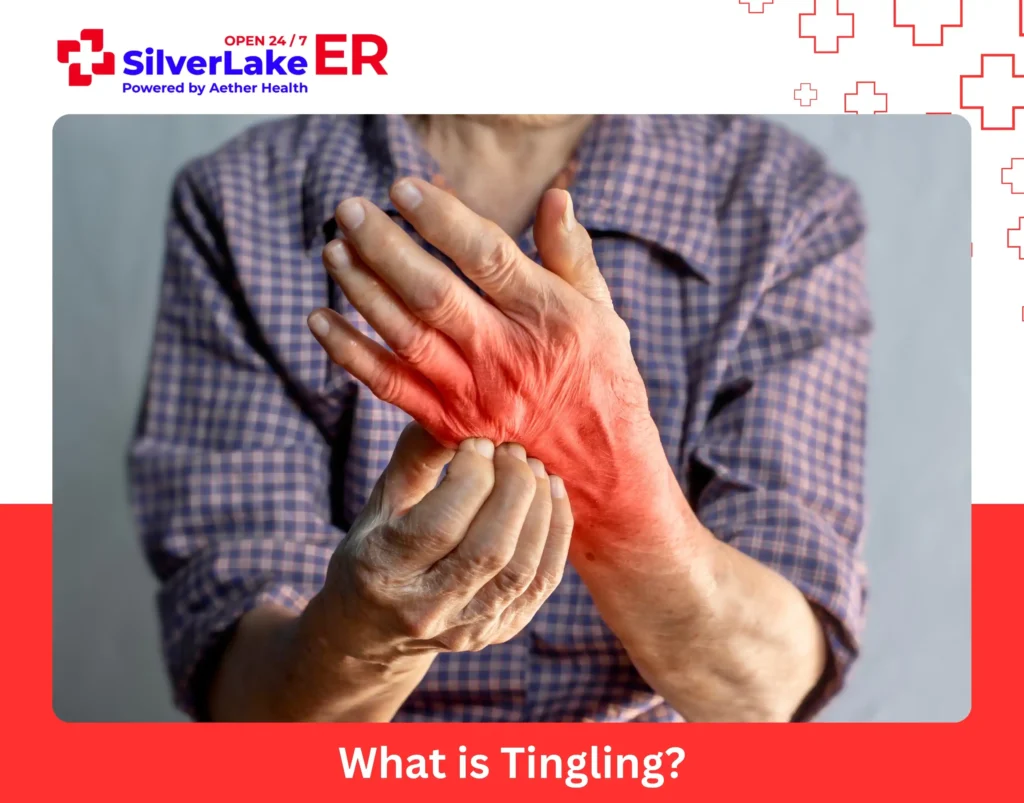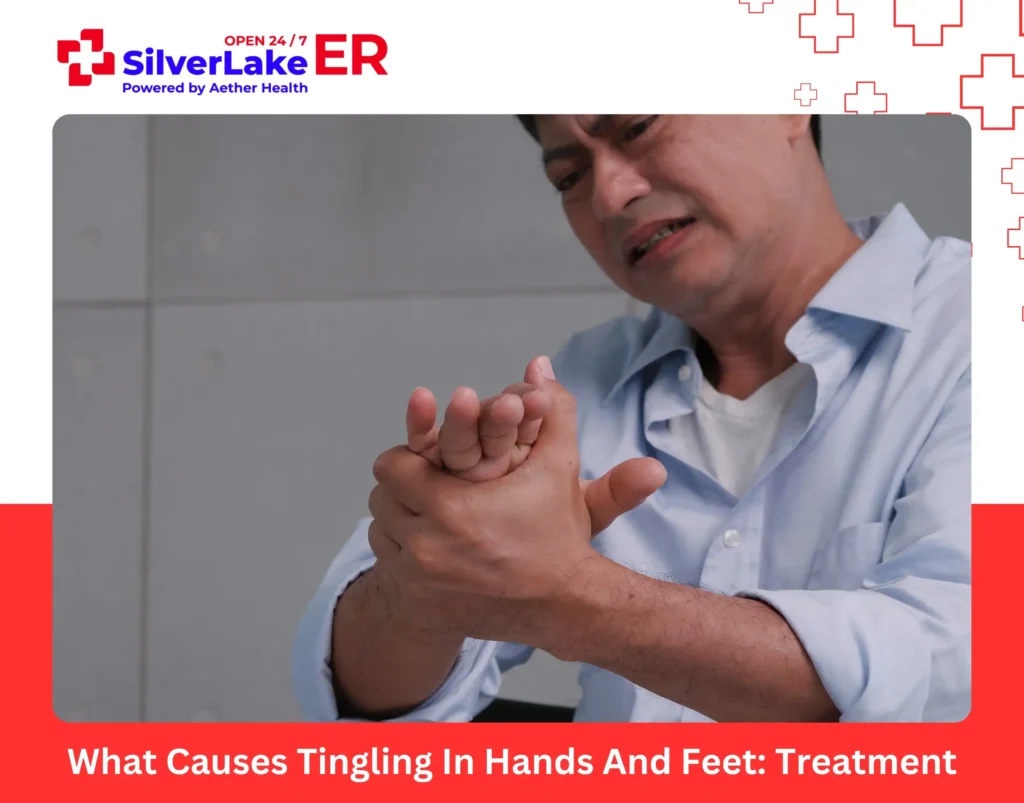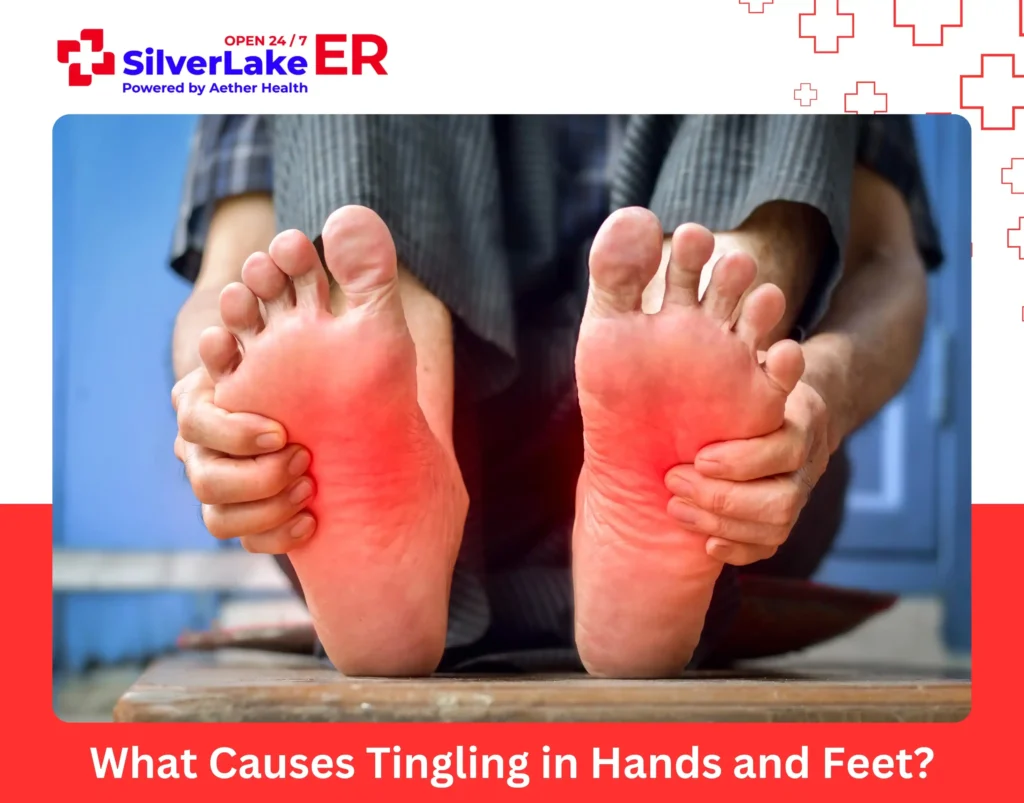You’re frozen, waiting for that pins and needles feeling to stop so you can get back to what you were doing. And once it fades, you forget it ever happened.
Yes, tingling in the hands and feet is usually just from a weird posture. But if it keeps happening, or lasts longer than a few minutes, take it as a warning sign. It could point to an underlying health issue like poor circulation, a pinched nerve, diabetes, or early nerve damage.
Let’s explore what causes tingling in hands and feet so you can protect your nerves and prevent long-term problems.
What is Tingling?

Tingling, also called paresthesia, feels like prickling, burning, or numbness. It usually happens when there’s pressure on a nerve or when blood flow is temporarily reduced. For example, sitting cross-legged too long can make your foot go numb.
But if it keeps happening, or if it shows up with other symptoms like weakness, pain, or balance problems, that could point to an underlying medical issue.
What Causes Tingling in Hands And Feet: 11 Common Causes
Here are some of the most common (and uncommon) reasons that cause tingling in hands and feet.
1. Pressure or Posture Related Compression
We’ve all experienced tingling after sitting cross-legged for too long or sleeping with a hand under the head. This is typically due to temporary compression of nerves or reduced blood flow. This type of tingling is harmless and goes away on its own.
Symptoms:
- Temporary numbness or tingling
- Resolves quickly once pressure is relieved
2. Peripheral Neuropathy
If tingling becomes chronic, the most common cause is peripheral neuropathy. This condition occurs when the peripheral nerves (those outside the brain and spinal cord) are damaged.
Common Causes:
- Diabetes (diabetic neuropathy)
- Alcohol abuse
- Vitamin B12 deficiency
- Kidney disease
- Certain medications
Symptoms:
- Persistent tingling or burning sensation
- Muscle weakness
- Sensory loss or balance problems
3. Carpal Tunnel Syndrome
This happens when the median nerve, which runs through the wrist, becomes compressed or irritated.
Common Cause:
Repetitive motions like typing, writing, or using tools.
Symptoms:
- Tingling, especially in the thumb, index, and middle fingers
- Hand weakness
- Symptoms are worse at night or with repetitive hand use
- Weak grip
- Hand clumsiness
It can get worse without treatment, but wrist braces, rest, and sometimes surgery can help.
4. Cervical or Lumbar Radiculopathy (Pinched Nerves)
A pinched nerve in your neck (cervical spine) can cause tingling in your arms or hands. If the nerve is compressed in your lower back (lumbar spine), you feel tingling in your legs or feet.
Common Causes:
- Herniated discs
- Arthritis
- Spinal injuries
Symptoms:
- Tingling in one arm (from neck issues) or one leg (from lower back issues)
- Pain radiating from the spine to the extremities
- Muscle weakness in the affected limb
5. Vitamin Deficiencies
Your nerves rely on vitamins, especially B vitamins (like B12, B6, or B1) to function. Lack of these vitamins can lead to nerve damage. People on vegan diets, those with absorption issues (like Crohn’s or celiac disease), or older adults are more at risk.
Common Causes:
- Poor diet
- Alcoholism
- Malabsorption conditions (e.g., celiac disease)
Symptoms:
- Tingling or numbness
- Fatigue or weakness
- Cognitive difficulties in severe cases
6. Multiple Sclerosis (MS)
Tingling is often one of the first symptoms of multiple sclerosis, a condition that damages nerve coverings in the central nervous system.
Symptoms:
- Episodes of tingling or numbness
- Vision problems
- Muscle weakness
- Coordination issues
- May affect one side of the body more than the other
7. Diabetes
High blood sugar levels over time can damage nerves, particularly in the feet and legs, a condition called diabetic neuropathy.
Symptoms:
- Gradual onset of tingling in feet, later spreading to hands
- Loss of balance
- Burning pain or numbness
8. Infections
Certain infections can affect the nervous system and cause tingling. Examples include:
- Shingles (caused by reactivation of the chickenpox virus)
- HIV
- Lyme disease
9. Autoimmune Disorders
Diseases like lupus or rheumatoid arthritis can cause inflammation in nerves, leading to tingling.
10. Toxins or Medication Side Effects
Exposure to heavy metals like mercury or lead, or side effects from chemotherapy drugs, can lead to peripheral neuropathy.
11. Stroke or Transient Ischemic Attack (TIA)
Sudden tingling, especially on one side of the body, can be a warning sign of a stroke or mini-stroke (TIA). Other red flags include:
- Slurred speech
- Confusion
- Face drooping
- Arm weakness
When to See a Doctor
Knowing what causes tingling in hands and feet is one part, understanding when to get it treated is just as important. These are the signs that you should seek help right away:
- Tingling that begins suddenly and is associated with weakness, confusion, or slurred speech (possible stroke)
- Tingling after a neck or back injury
- Tingling that progresses quickly or is getting worse
- Persistent symptoms that don’t go away or keep returning
- Tingling along with muscle weakness, vision issues, or problems walking
A medical evaluation may include blood tests, diagnostic imaging (like MRI), or nerve conduction studies to determine the cause.
What Causes Tingling In Hands And Feet: Treatment

Treatment depends entirely on the cause:
- Posture or pressure related: Simple movement or stretching usually helps.
- Neuropathy from diabetes or deficiencies: Managing blood sugar, taking supplements, or adjusting medication can help.
- Carpal tunnel syndrome: Wrist splints, ergonomic changes, or surgery in severe cases.
- Pinched nerve: Physical therapy, pain management, and in some cases, surgical intervention.
- MS or autoimmune diseases: Immunomodulatory drugs and symptom management.
- Toxin-related: Removing the source of the toxin or switching medications.
Home Remedies for Mild Tingling

If tingling is occasional or caused by mild issues like posture, try these tips:
- Stretch and move around regularly
- Massage the affected area
- Avoid alcohol and smoking (both worsen nerve health)
- Ensure a balanced diet, especially rich in B vitamins
- Maintain good posture while sitting or sleeping
Final Thoughts
Tingling in the hands and feet can be anything from harmless to a red flag for serious nerve or metabolic conditions. If you’ve persistent or worsening symptoms, visit your nearest emergency room for a proper diagnosis.
The onsite labs at Silverlake ER, can quickly find out what causes tingling in hands and feet and start you on the right treatment. Early diagnosis can help prevent complications and restore normal nerve function.
FAQs
1: Is tingling always a sign of nerve damage?
Not always. Temporary tingling can occur from posture or pressure. But chronic or frequent tingling often involves nerve irritation or damage.
2: Can anxiety cause tingling in the hands and feet?
Yes. Anxiety can trigger hyperventilation or muscle tension, which may lead to tingling sensations, especially in the fingers or around the mouth.
3: Is tingling a symptom of a stroke?
It can be, especially if it’s sudden and accompanied by weakness, trouble speaking, or confusion. Seek emergency care immediately.
4: What vitamin deficiency causes tingling?
Vitamin B12 deficiency is a common culprit. Deficiencies in B6, B1, and vitamin E can also affect nerve function.
5: When should I worry about tingling in my hands or feet?
If it’s persistent, worsening, or associated with other symptoms like weakness, balance issues, or vision changes, see a healthcare provider.




